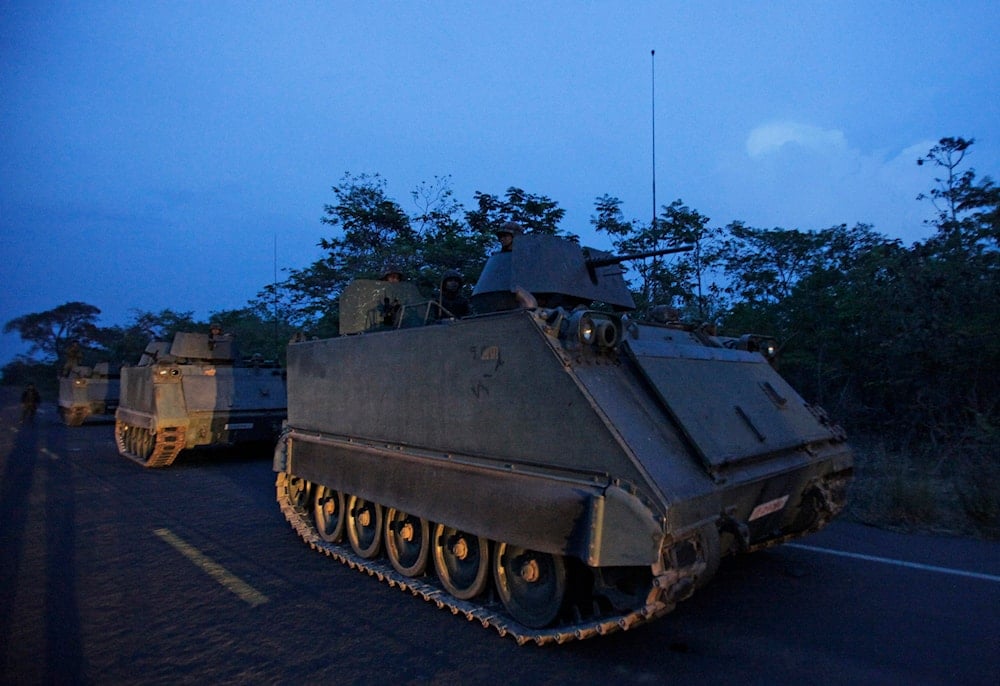Thailand, Cambodia clash with jets and rockets in deadly border row
At least 11 civilians were killed after Cambodia fired rockets into Thailand, triggering Thai airstrikes in a sharp escalation of the Emerald Triangle border conflict.
-

Thai soldiers on armored personnel carriers take a position at the border during fighting between Thailand and Cambodia in Surin province, northeastern Thailand, on April 26, 2011. (AP)
An exchange of heavy fire between Cambodia and Thailand on Thursday resulted in at least 11 civilian deaths, marking a dangerous escalation in the decades-long dispute over the contested Emerald Triangle region where the borders of both countries and Laos meet.
Thailand launched airstrikes targeting Cambodian military positions after rockets and artillery shells fired by Cambodian forces hit civilian areas in Thailand’s Sisaket province.
The Thai Ministry of Public Health confirmed that at least 11 civilians were killed, most of them students inside a convenience store attached to a petrol station. The store was struck by a rocket barrage that caused a massive fire and destruction at the site.
According to Thai military officials, six F-16 fighter jets were scrambled from Ubon Ratchathani province and struck two Cambodian military targets. The Thai military described the airstrikes as a direct response to a targeted attack on civilians.
Clashes reignite long-running Emerald Triangle dispute
The renewed violence follows a series of confrontations over the disputed area surrounding ancient temples located near the Thai province of Surin and Cambodia’s Oddar Meanchey.
According to Thai military sources, the fighting began when Cambodian troops, including one armed with a rocket-propelled grenade launcher, approached a Thai military post near Ta Muen temple. Gunfire erupted shortly after 8:20 am local time.
Cambodian Defense Ministry spokesperson Maly Socheata accused Thailand of initiating the violence with an "armed assault on Cambodian forces," adding that Cambodian troops exercised their right to self-defense under international law to repel the Thai incursion.
Thailand, in turn, blamed Cambodia for provoking the clash, accusing Cambodian soldiers of firing rockets into Thai territory and targeting civilians.
The military confrontation has been accompanied by a swift diplomatic breakdown. Cambodia has downgraded diplomatic ties with Thailand to the "lowest level," recalling all but one of its diplomats and expelling Thai officials from Phnom Penh.
The diplomatic rupture follows Thailand’s expulsion of the Cambodian ambassador and the recall of its envoy in protest over a landmine blast that injured five Thai soldiers earlier in the week.
Cambodian Prime Minister Hun Manet has formally requested an urgent UN Security Council meeting to address what his foreign ministry described as "unprovoked military aggression" by Thailand. Meanwhile, Malaysia, the current chair of ASEAN, called on both sides to "stand down" and begin talks.
Political ramifications in Thailand and beyond
The border conflict has also triggered political instability within Thailand. Prime Minister Paetongtarn Shinawatra has been suspended from office pending an ethics probe, further complicating the government’s handling of the crisis.
The crisis intensified after a leaked phone call between Paetongtarn and former Cambodian Prime Minister Hun Sen surfaced, sparking legal investigations in Thailand.
China, a close ally of Cambodia, expressed “deep concern” over the clashes and called for restraint. Beijing also advised its citizens in Cambodia to avoid border areas. Malaysian Prime Minister Anwar Ibrahim reiterated the need for immediate dialogue and warned of regional consequences.

 3 Min Read
3 Min Read










